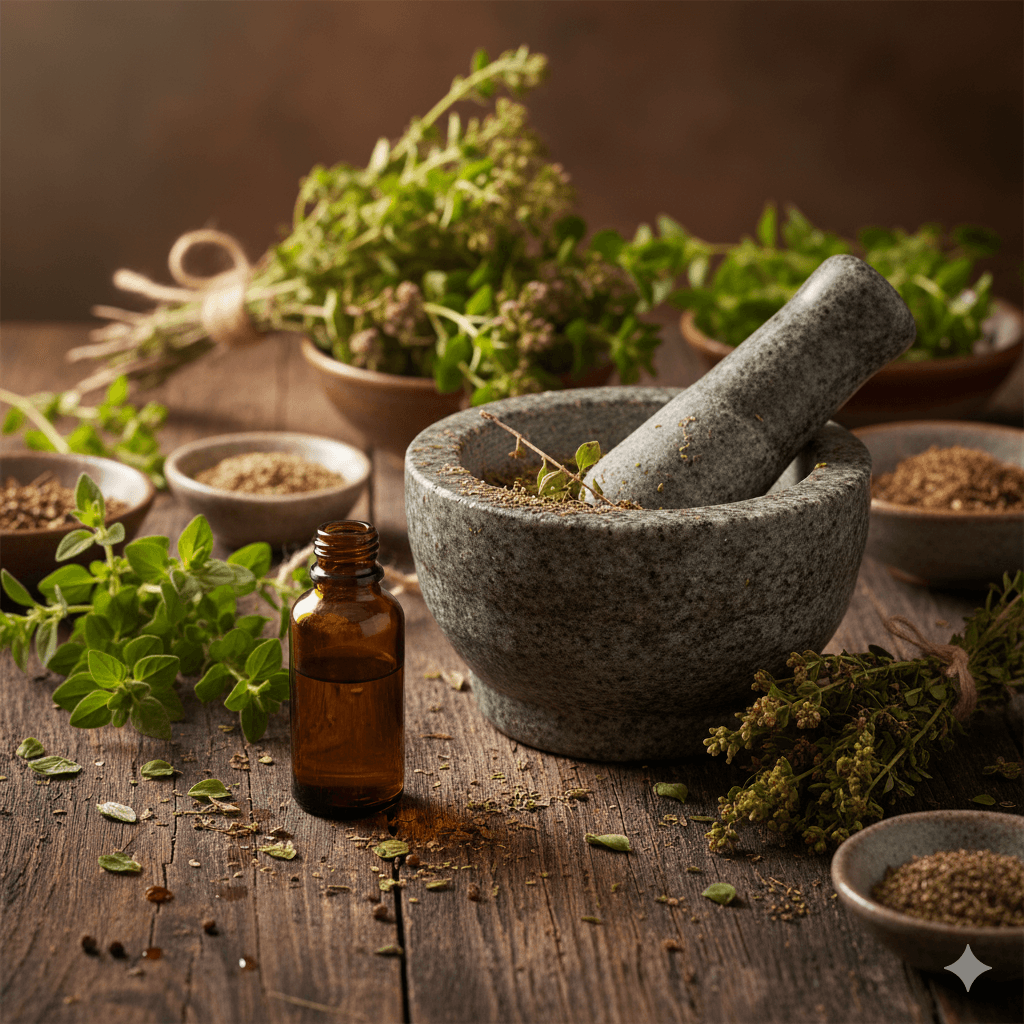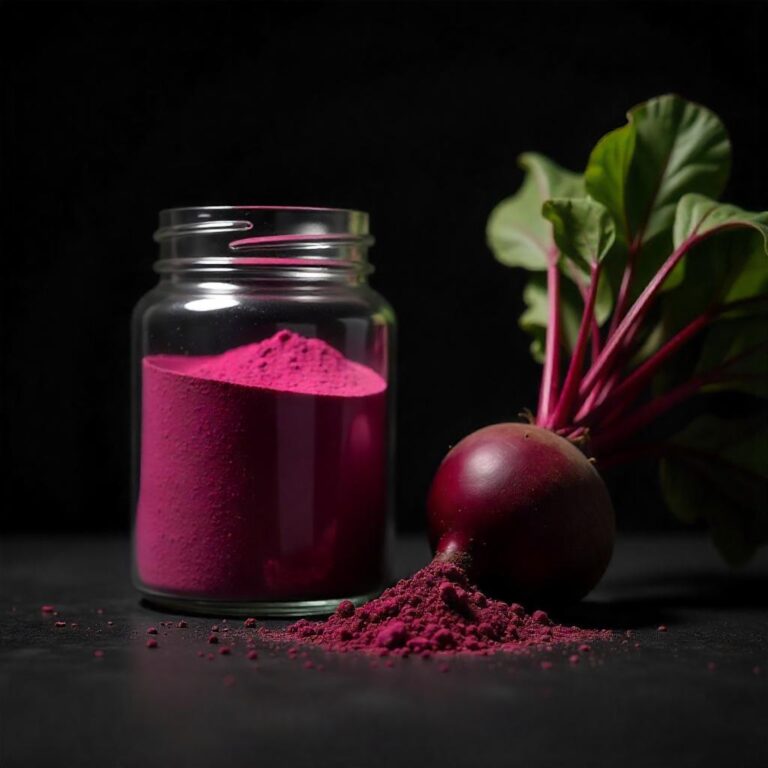Oregano Oil: Benefits, Uses, Safety, and How to Use It the Right Way
Oregano oil is a concentrated natural extract with powerful antimicrobial, antioxidant, and anti-inflammatory properties that support immune health, digestion, and overall wellness. While oregano is often used as a flavorful herb in cooking, its oil has a long history in traditional medicine and is now gaining attention in modern health routines for its wide range of potential benefits.
This guide explains what oregano oil is and how it works. It covers the science behind its benefits. You will also learn safe ways to use it and what to know before adding it to your routine.
What Is Oregano Oil?
Oregano oil comes from the leaves and shoots of the oregano plant (Origanum vulgare). It is made by extracting the active compounds. It belongs to the mint family and has been valued for centuries for its natural healing properties. Unlike the culinary herb, oregano oil is much more concentrated and is typically used in small, carefully measured amounts.
The oil is available in two main forms:
- Essential oil: Extremely concentrated and typically used for topical or aromatic purposes.
- Oil of oregano (liquid extract or capsules): This product is meant for internal use. It is often standardized to contain a specific percentage of active compounds, like carvacrol.
Key Active Compounds
The main benefits of oregano oil come from two natural compounds found in high concentrations:
1. Carvacrol
Carvacrol is the most studied compound in oregano oil. It has strong antibacterial, antifungal, and antiviral properties. Research suggests it can disrupt the cell membranes of harmful microorganisms, making it harder for them to survive and spread.
2. Thymol
Thymol is a natural antiseptic that supports the immune system and helps protect the body from toxins. It also has antifungal properties and contributes to the oil’s distinct aroma.
Together, carvacrol and thymol give oregano oil its potent health-promoting effects.

Evidence-Based Health Benefits
1. Supports the Immune System
Many people use it during seasonal changes or when they start to feel run-down. Its antimicrobial properties may help the body respond to common bacteria and viruses, supporting overall immune function.
2. Natural Antibacterial and Antifungal Properties
Several studies show oregano oil may be effective against bacteria like E. coli, Salmonella, and some antibiotic-resistant strains. It’s also shown to inhibit the growth of fungi, including Candida albicans, which can cause yeast overgrowth.
3. Respiratory Health Support
Oregano oil is often used as a natural remedy to help clear nasal congestion, soothe a sore throat, and support easier breathing. Its compounds may help fight the microbes that cause respiratory discomfort.
4. Gut and Digestive Health
Oregano oil may help balance gut bacteria by reducing harmful microbes while allowing beneficial bacteria to thrive. Some practitioners use it as part of protocols for conditions like small intestinal bacterial overgrowth (SIBO), though this should always be done under professional supervision.
5. Antioxidant Protection
Oregano oil contains compounds that help neutralize free radicals. Antioxidants support the body’s natural defense against oxidative stress, which can contribute to aging and chronic diseases.
How to Use Oregano Oil
Because oregano oil is highly concentrated, a small amount goes a long way. Here are the most common ways it’s used:
1. Internal Use (Liquid or Capsules)
- Capsules are popular because they provide a controlled dose and mask the strong taste.
- Liquid extracts can be added to water or juice. Typically, only 1–4 drops are used per serving. Follow the product’s instructions carefully.
2. Topical Use
Oregano essential oil must be mixed with a carrier oil. You can use oils like coconut or olive oil. This is important before applying it to your skin. It can be used for:
- Minor skin irritations
- Fungal infections like athlete’s foot
- Occasional acne spots
3. Aromatic Use
Some people add a few drops of oregano essential oil to a diffuser. This method is not as common as using it inside or on the skin. However, it can freshen the air and may help with breathing a little.
Dosage Guidelines and Precautions
There is no one-size-fits-all dosage for oregano oil. The right amount depends on the concentration of the product and the individual’s needs.
- For general wellness: Many liquid extracts suggest taking 1–4 drops mixed with water. You can take this 1–3 times a day for short periods.
- For capsules: Follow the manufacturer’s suggested serving size, usually 100–200 mg per capsule.
Oregano oil is strong, so it’s best to use it in short cycles. For example, use it for 2 to 4 weeks instead of all the time.
Important:
- Not recommended for pregnant or breastfeeding women without medical guidance.
- Those with allergies to plants in the mint family should avoid it.
- People taking medications or managing chronic conditions should consult a healthcare provider first.
Possible Side Effects
When used correctly, oregano oil is generally safe for most healthy adults. However, potential side effects can occur, especially with overuse or high doses:
- Stomach upset or digestive discomfort
- Burning sensation in the mouth or throat (if not diluted properly)
- Skin irritation or rash when applied undiluted
Start with a low amount to test your tolerance, and always dilute it when using topically.
How to Choose a Quality Oregano Oil
The quality of oregano oil can vary widely. To ensure you’re getting a safe and effective product, look for:
- 100% pure oil without synthetic additives or fillers
- Standardized carvacrol content, ideally between 60% and 80%
- Clear labeling of the extraction method and ingredients
- Reputable brands that provide third-party testing or quality assurance
Oregano oil is a powerful natural remedy with real antimicrobial and antioxidant properties. When used correctly, it can support immunity, respiratory health, and gut balance. Since it is very concentrated, the key is to use small amounts. Use it at the right time and choose a high-quality product.
FAQs About Oregano Oil
Is oregano oil the same as oregano essential oil?
No. Oregano essential oil is usually for skin use or scent. Oil of oregano, often in capsules or liquids, is for internal use.
Can I take oregano oil every day?
It’s best used in short cycles rather than continuously. Prolonged daily use can irritate the digestive tract and may disrupt gut balance.
Can oregano oil replace antibiotics?
No. While oregano oil has natural antimicrobial properties, it’s not a substitute for prescribed antibiotics in serious infections. Always follow your healthcare provider’s advice.
How quickly does oregano oil work?
Some people notice effects, like respiratory relief, within a few days. For gut support, it may take a few weeks of structured use under professional guidance.
Can children use oregano oil?
Oregano oil is very strong and not typically recommended for young children unless under professional supervision.
What is the oil of oregano good for?
Oil of oregano is used for several reasons. It can help the immune system. It may improve gut health. It also protects the body from bacteria, fungi, and some viruses. Its main compounds, carvacrol and thymol, have strong antimicrobial and antioxidant properties. People often use it during seasonal changes, for occasional digestive issues, or to support respiratory health naturally.
How to take oregano oil by mouth?
To take oregano oil by mouth safely, dilute 1–4 drops in water or juice, or use a capsule form that provides a pre-measured dose. Capsules are the easiest way to avoid the strong taste. If using a liquid, follow the product’s instructions and start with the lowest recommended amount to test your tolerance. It’s best taken for short periods, usually 2–4 weeks at a time, rather than continuously.
What happens to your body when you start taking oregano oil?
When you start taking oregano oil, your body may experience a few noticeable changes. Many people report clearer sinuses, improved digestion, and increased immune resilience within days or weeks. Because oregano oil targets harmful microbes, some may experience temporary digestive changes as the gut microbiome adjusts. If taken in high doses or for too long, it may irritate the stomach or throat, which is why moderation is key.
What infections can oregano oil cure?
Oregano oil has antibacterial, antifungal, and antiviral properties, which can help the body fight various infections naturally. Research shows it may work well against bacteria like E. coli, Salmonella, and Staphylococcus aureus. It may also be effective against fungi like Candida albicans. However, oregano oil should not replace prescribed antibiotics or medical treatment for serious infections. It can be used as a complementary support, but always under professional guidance.
Scientific References
- Nostro A, et al. “Antibacterial activity of plant extracts against Helicobacter pylori.” Phytotherapy Research.
- Lambert RJW, et al. “A study of the minimum inhibitory concentration and mode of action of oregano essential oil, thymol and carvacrol.” Journal of Applied Microbiology.
- Force M, Sparks WS, Ronzio RA. “Inhibition of enteric parasites by emulsified oil of oregano in vivo.” Phytotherapy Research.
- Skoula M, et al. “Carvacrol and thymol content in the essential oil of oregano.” Journal of Agricultural and Food Chemistry.







